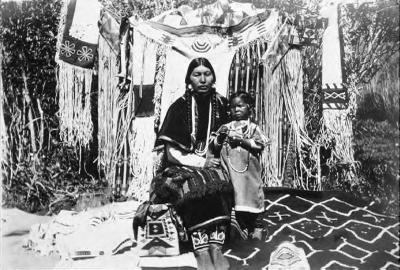|
|
Chinook Jargon Workshop Chinook Jargon Chinook
Jargon Workshop 2000
Images of Chinook Mother and Child and map of the NW Coastal Tribes courtesy
American Memory Project
 The Third
Annual Chinuk Wawa Lu'lu (Chinook Jargon Workshop) will be held at Grand Ronde, Oregon from August 25 to 27. Chinook
Jargon, or Chinuk Wawa as it speakers refer to it, was commonly spoken in the Pacific Northwest from northern California
to southern Alaska. As a Native American lingua franca, it was used among the various ethnic groups during the
nineteenth and early twentieth centuries. The Workshop consists of language classes, discussion groups and presentations
in hopes of reviving Chinook Jargon usage in the Pacific Northwest. The goal of the group is to increase people's
knowledge of Chinook Jargon.
The Third
Annual Chinuk Wawa Lu'lu (Chinook Jargon Workshop) will be held at Grand Ronde, Oregon from August 25 to 27. Chinook
Jargon, or Chinuk Wawa as it speakers refer to it, was commonly spoken in the Pacific Northwest from northern California
to southern Alaska. As a Native American lingua franca, it was used among the various ethnic groups during the
nineteenth and early twentieth centuries. The Workshop consists of language classes, discussion groups and presentations
in hopes of reviving Chinook Jargon usage in the Pacific Northwest. The goal of the group is to increase people's
knowledge of Chinook Jargon.
For Tony Johnson preserving Chinuk Wawa is more than just a job. Johnson, the Language Specialist for the Confederated
Tribes of Grand Ronde, Oregon, and a Chinook tribal member, is teaching his son, Sam, to speak the old language.
Johnson and his wife work to use Chinuk Wawa whenever possible. "Sam goes to sleep with lullabies and wakes
up with greetings all in Chinuk Wawa," says Johnson. Johnson, coming from a family of educators, continues,
"Besides, our family, I also teach Chinuk Wawa classes to a group of adults at night (for University of Oregon
credit), preschool and Before and After School program students during the day and we are compiling a dictionary
in between." He does this in addition to his other duties at the tribal office. Johnson will be one of the
instructors at the workshop.
Johnson will share teaching duties with Henry Zenk, an anthropologist who has been studying Chinook Jargon for
the last 20 years. Zenk, a world's leading authority on the language, wrote his doctoral thesis on how Chinook
Jargon was used at Grand Ronde during the period 1856 - 1907 and has since published a number of articles on the
language. Zenk and Johnson are working together on a dictionary.
.jpg) Chinook Jargon is based on the speech of the Chinook people whose homeland is along the lower Columbia
River. It has elements of English and French, as well as, other Native American languages. During the 1800s, the
Northwest was an area where over 100 different languages were spoken. The various groups, Native Americans, fur
traders and settlers needed to communicate with each other so they adopted the Chinook Jargon. The language expanded
during the early 1800s and became the primary language of some communities during the later half of that century.
Today people still use Chinook Jargon when they refer to many places in the Northwest, but most people don't know
they are using it. Alki Beach, Skookumchuck River, Tumwater, PilChuck River and Olallie Park, all owe their names
to Chinook Jargon. The expression high muckamuck or big muckamuck, when referring to a "big shot," cheechako,
the Alaskan expression for a "newcomer," and the name of the Hi-yu Festival, held each year in Seattle,
are also derived from the language.
Chinook Jargon is based on the speech of the Chinook people whose homeland is along the lower Columbia
River. It has elements of English and French, as well as, other Native American languages. During the 1800s, the
Northwest was an area where over 100 different languages were spoken. The various groups, Native Americans, fur
traders and settlers needed to communicate with each other so they adopted the Chinook Jargon. The language expanded
during the early 1800s and became the primary language of some communities during the later half of that century.
Today people still use Chinook Jargon when they refer to many places in the Northwest, but most people don't know
they are using it. Alki Beach, Skookumchuck River, Tumwater, PilChuck River and Olallie Park, all owe their names
to Chinook Jargon. The expression high muckamuck or big muckamuck, when referring to a "big shot," cheechako,
the Alaskan expression for a "newcomer," and the name of the Hi-yu Festival, held each year in Seattle,
are also derived from the language.
Jeffrey Kopp, descendant of people who arrived in Oregon in the 1860s, maintains a Web site on Chinook Jargon.
Kopp became aware of Chinook Jargon, not in his native Portland, but during a stay in Seattle. Kopp says, "Many
of my Seattle friends used Chinook Jargon words, such as klahani for 'outside' and kluchmen for 'wife,' as slang."
Kopp's website is at http://www.geocities.com/Athens/Delphi/6460/jargintr.htm.
Workshop details are available on the Web (www.adisoft-inc.com/chinook.html) or by contacting Jim Holton (510-483-3556)
or Dave Robertson (509-835-5764).
http://www.geocities.com/Athens/Delphi/6460/jargintr.htm
http://63.198.222.34/adisoft/LuluEnglish.html![]()
|
|
| Canku Ota is a free Newsletter celebrating Native America, its traditions and accomplishments . We do not provide subscriber or visitor names to anyone. Some articles presented in Canku Ota may contain copyright material. We have received appropriate permissions for republishing any articles. Material appearing here is distributed without profit or monetary gain to those who have expressed an interest. This is in accordance with Title 17 U.S.C. section 107. |
|
Canku Ota is a copyright of Vicki Lockard and Paul Barry. |
|